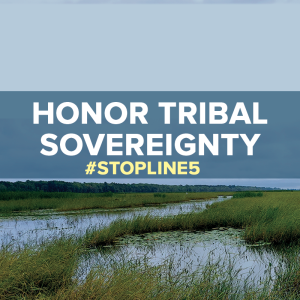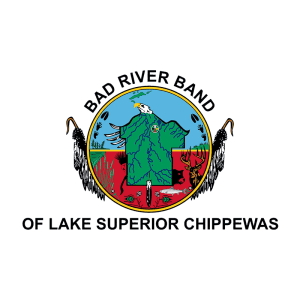Biden administration agrees that Enbridge is trespassing on Bad River Band Reservation

This week, the U.S. Department of Justice (DOJ) weighed in for the first time on a legal challenge brought by a Wisconsin-based Tribal Nation against Enbridge, a Canadian corporation whose dangerous and outdated Line 5 oil pipeline has been trespassing on the reservation of the Bad River Band of Lake Superior Chippewa for more than a decade. The amicus brief acknowledges that Enbridge lacks the legal right to keep its pipeline on the Tribal Nation’s reservation, while not proposing any remedy to stop the harm to the Band.
The UN Permanent Forum on Indigenous Issues has criticized Canada for trampling Indigenous rights to protect Line 5 and other fossil fuel interests, and a UN international human rights expert has recommended that the U.S. and Canada shut it down.
The Bay Mills Indian Community (BMIC) and partners responded to the news:
“The filing leaves more questions than answers. It also leaves Bad River, other Tribal Nations throughout the region, and the 40 million people that rely on the Great Lakes at risk of a catastrophic spill. We fear it will take Line 5 failing again, and the disaster of an oil spill for our position to be taken seriously. This isn’t just about tribes, it is about clean water, it is about life. It is about every U.S. citizen and preserving our natural resources for generations to come,” said BMIC President Whitney Gravelle.
“While the United States’ brief acknowledged both that Enbridge has been trespassing for more than 10 years and the importance of tribal sovereignty, we are perplexed by the false equivalency that the United States suggests between its tribal treaty and trust obligations to Indian Country and its diplomatic relationship with Canada,” said Native American Rights Fund (NARF) Staff Attorney Wesley James Furlong.
“The U.S. brief misses the mark on the Transit Pipeline Treaty by failing to provide the legal analysis requested by the Seventh Circuit,” said Managing Attorney Debbie Chizewer for Earthjustice, which co-counsels with NARF in the representation of BMIC. “The Transit Pipeline Treaty allows states and Tribal Nations to protect the environment, and they must act because Line 5 poses an urgent threat to the Band, other regional Tribal Nations, and all who rely on the Great Lakes.”

Line 5 is a dangerous and outdated 645-mile pipeline that transports up to 23 million gallons of crude oil and natural gas liquids each day. Since 2013, Enbridge has earned over $1 billion by knowingly trespassing on the Bad River Band’s reservation, where there are only 11 feet of bank remaining between the pipeline and the current of the Bad River at its narrowest point. Last June, a federal court ruled Line 5 a “public nuisance” with an imminent threat of rupture that could contaminate the Band’s drinking water, poison plants and wildlife, and devastate the region’s economy. However, the order allows the pipeline to continue operating in trespass until June of 2026.
Both sides are now appealing before the 7th Circuit Court of Appeals, which called on the U.S. government to end its silence and formally weigh in on the issue.
More: Amicus brief from 28 Tribal Nations and four organizations
More blog posts

